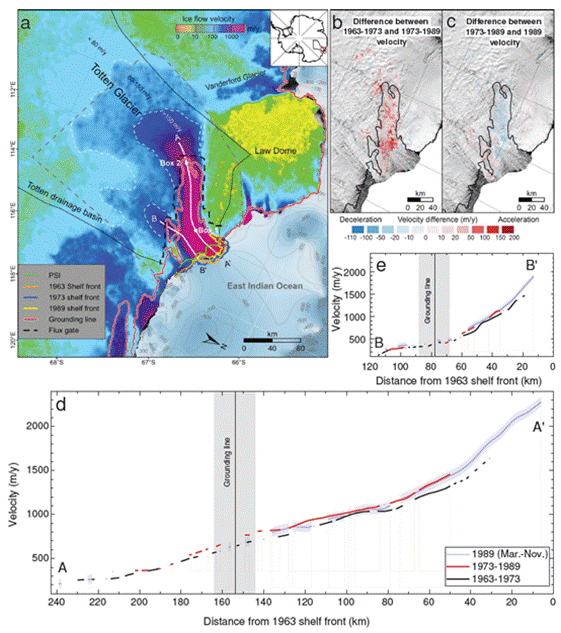On July 10th, the research team led by Professor Rongxing LI from the College of Surveying and Geo-informatics of Tongji University and the Application Center of Spatial Information Science and Sustainable Development made new research findings jointly with researchers from Queensland University, Australia, and the Otago University, New Zealand. Their research paper entitled "Satellite record reveals 1960s acceleration of Totten Ice Shelf in East Antarctica" was published in Nature Communications. The team found that, contrary to the general trend of a slight increase of ice material in the ice sheet of East Antarctica, the ice flow in Wilkes Land of East Antarctica is accelerating and the loss of ice material is intensifying, among which the change of Toteng Glacier is the most prominent.
Professor Li's team took the lead in applying the first-generation ARGON satellite film images and early Landsat satellite data to reconstruct the three-phase historical ice velocity field of Toteng Glacier from 1963 to 1989 for the first time and formed a long-term ice velocity series for nearly 60 years together with recent remote sensing data products. Further calculation and simulation show that the acceleration of ice flow and the increase of material emission in Toten Glacier began in 1963, and the short-term acceleration was mainly related to the large-scale disintegration of the ice shelf front during 1973-1985, while the acceleration near the grounding line was caused by the intrusion of warm water around the polar deep layer. From 1963 to 2018, the continuous melting of the bottom of the ice shelf drove the acceleration of ice flow and the continuous increase of ice flux near the grounding line, making Toten Glacier the largest contributor to global sea level rise among the East Antarctic glaciers.
Due to the low quality and quantity of satellite remote sensing data before 1990, scientists knew little about the early ice velocity field and material balance in this region, which increased the uncertainty of estimating and predicting the contribution of global sea level rise. According to the research, with the continuous development of this trend, long-term remote sensing and ground monitoring in this region should be strengthened in the context of global warming.

New research achievements in global change by LI's team
This research was supported by the National Key R&D Plan, the National Natural Science Foundation of China, and the basic scientific research of first-class universities.
Link to paper: https://doi.org/10.1038/s41421-023-00519-1